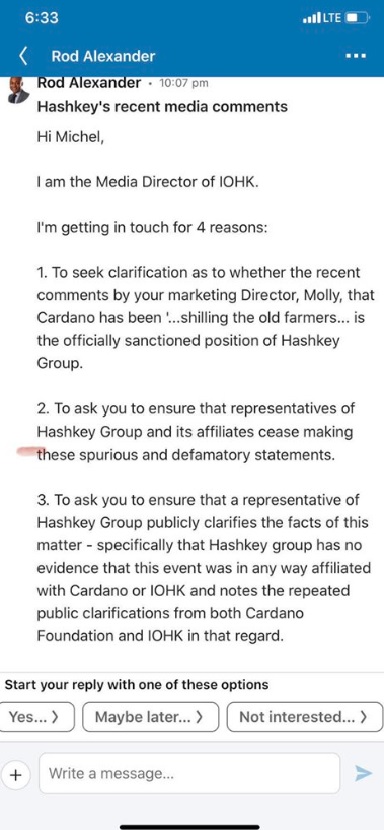‘Cancel Cardano’? ‘You can’t cancel Bitcoin’… Cancel culture rears its head in crypto-community

Cancel Culture – A term that has been doing the rounds lately after the open letter by Harper’s, one signed by the likes of Noam Chomsky, Margaret Atwood, Salman Rushdie, and J.K Rowling went viral. At its simplest, it refers to the withdrawal of popular support after a public figure or entity says or does something that people believe is objectionable or condemnable. The crypto-community isn’t immune from cancel culture either, with the issue emerging recently after IOHK’s Charles Hoskinson took issue with a tweet.
ADA is ranked no.6 now, after it got shilling to the old farmers by MLM . There’s a conference host by 8btc today , bunch of elders bought a banner written AD roadshow , they took a photo every quickly and left.. pic.twitter.com/ZVDGdGuejp
— Molly (@molllliy) July 5, 2020
The tweet in question referred to the viral video of Chinese farmers being advertised Cardano, the market’s seventh-largest cryptocurrency and one of its best performers this year. Now, Charles Hoskinson was quick to respond to the same, stating “These events have nothing to do with ADA or its recent appreciation.” Going on to say that they are illegal, Hoskinson said that the event had no affiliation with anyone in the Cardano ecosystem.
Should be case closed, right? Wrong, because soon after, the author of the tweet, Hashkey Hub’s Mo Li, received some form of a cease and desist letter from IOHK’s representatives.

Source: Twitter
Strong-arming or cause for action?
The reactions to this episode are worth covering because it once again sheds light on the faultlines that divide the crypto-community. Check out Hoskinson and Cardano’s response to Mo Li’s tweets, and then check out the reactions to Li’s response. The backlash Cardano is getting, for actions that may or may not have been justified, is staggering, with “Cancel Cardano” doing the rounds too.
Cancel Cardano
Herein lies the tragedy of entities operating in the cryptocurrency market.
Bitcoin, and by extension the cryptocurrency ecosystem, was built on the solid foundations of Libertarianism, an ideology that champions the idea of free speech and expression. The concept of cryptocurrencies enshrined these very ideas, which is why even today, Bitcoin is governed by an open-source MIT license that allows anyone to use, share, and modify the software at no additional cost.
The actions of IOHK, on the face of it, seem to be contrary to those ideals. In fact, the episode shares striking similarities with mainstream cases where big corporations and firms have strong-armed people into taking back an opposing comment or a claim.
Always interesting to see big crypto companies spend millions on advertisements and then have a CEO that behaves like that.
Even if he were in the right, the lack of professionalism makes him, ADA and his company look bad to anyone on the sidelines.
— DonAlt (@CryptoDonAlt) July 7, 2020
By that idealistic yardstick, Hoskinson should have just let this one go after stating categorically that IOHK and the Foundation had nothing to do with the aforementioned event. However, playing devil’s advocate, is that as easy as it sounds? The cryptocurrency market has for long struggled to maintain its mainstream image as a serious industry, despite its history being plagued by hundreds of scams and hacks and thefts.
Entities like the IOHK and Cardano have played a crucial role in rehabilitating the industry’s image. Why then wouldn’t they forcefully respond to a tweet which, in all honesty, may have falsely alluded to something sinister, despite its author claiming otherwise? Would they take a chance with the reputational risk such a tweet may carry for itself and the wider market?
Cancel everything….. except Bitcoin
There are arguments to be made for both sides here, but that’s not the point. The point is that a lot of the same people who were indignant about Cardano supposedly strong-arming a digital asset management firm exec by citing sacrosanct principles of free speech are the same ones to call for canceling Cardano. While many altcoins continue to face questions over their supposed utility and existence, most people are happy to share memes that say “You can’t cancel Bitcoin.”
You can’t cancel Bitcoin.
— Cameron Winklevoss (@winklevoss) June 19, 2020
Balaji is rightfully framing cancel culture as an enemy to be fought, and I am here for it.
Messing with someone’s livelihood is an act of violence. Don’t be surprised when they respond aggressively.
— Ryan Selkis (@twobitidiot) July 7, 2020
Cancel culture isn’t something I condone. But, ideally, it should only come into play for the right reasons. As the IOHK episode reveals, that isn’t the case universally as right within the crypto-community, it is being used to further divides between coins and proponents in a vicious exercise of crypto-tribalism.
Look no further than how the community reacted to Vitalik Buterin’s misguided attempt at using World War II analogies to explain Ethereum’s position in the market. While Buterin should have been skewered on the stake of public opinion for his tasteless analogies, he was instead bombarded by maximalists who just wanted to argue for argument’s sake, while propping up Tron as a supposed competitor.
Now, look at the case of Brave browser, a privacy-centered platform that was recently alleged to have harassed an open-source contributor who worked on a competitor’s platform. Hardly any outrage accompanied those allegations. You know why? Because while most of the community holds the idea of privacy near and dear, there is no tribalistic clique around it, and by extension, around projects like Brave.
Cancel culture is not the solution to any problem. In fact, according to research, such a solution may do more harm than good since it breeds a private echo chamber where views and opinions are used for confirmation bias and group-think, rather than introspection and evaluation.
A free exchange of thoughts and ideas, even when they are problematic and tasteless, is at the core of what cryptocurrencies are supposed to be. Calling for canceling that crypto or that public figure, that kind of behavior isn’t what the community should be about.






